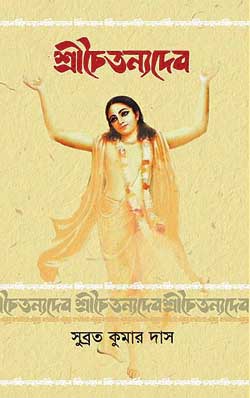 While reading the book 'Srichaitanyadev' by Subrata Kumar Das, I was reminded of the following four lines of the great English Romantic poet, William Blake:
While reading the book 'Srichaitanyadev' by Subrata Kumar Das, I was reminded of the following four lines of the great English Romantic poet, William Blake: "To see the world in a grain of sand,
And Heaven in a wild flower,
To hold infinity in the palm of your hand,
And eternity in an hour."
The author in this book has aspired to achieve the same. He has endeavoured to compress five centuries, following the demise of Sri Krishna Chaitanya in 1533, in this book, its moderate size notwithstanding.
Though Sri Chaitanyadev lived for only forty seven years, he is still a force to be reckoned with in religion, literature, music, dance and drama in India and abroad, spanning a period of about five hundred years. Not a single book was written by Chaitanyadev, but hundreds of books have been written on him by his contemporaries, as well as successors, both Indian and foreigners. He was a colossal figure in Indian milieu. He was the single most influential person, after Lord Gautama Buddha, who acted as a catalytic agent and literally changed the destiny of a nation.
Subrata has rightly pointed out that though Chaitanyadev did not elaborate his doctrine, many authors, all over the globe, for several centuries, have written profusely about Chaitanyadev's doctrine. Chaitanyadev was a versatile genius and his personality was multidimensional. He was the first Bengali revolutionary that shook the very foundation of the Indian society -- he did not fight with arms, but with musical instruments; his goal was not to conquer other countries, but to conquer the hearts of people. His "mantra" was not "to hate", but "to love".
We fully agree with Subrata that Chaitanyadev was a great social reformer. He freed Hinduism from the shackles of Brahmins and opened its portals to the common man, irrespective of caste, creed, religion, gender and nationality. He embraced the untouchable, honoured the women folk and protected the weak and the vulnerable. Like Lord Sri Krishna of Mahabharat, he protected the oppressed and crushed the oppressor, but the means he adopted was unlike Krishna. He challenged the illegal threat of Kazi, the Bengal ruler, to ban Kirtan (the devotional song), roared like lion and organized rally of common man and compelled Kazi to withdraw his order. It was for the first time in the history of India, people's will won over the state power under the leadership of Chaitanya. Subrata has drawn our attention to the fact that by then he was not 'Chaitanya', rather he was embraced and popularized as an incarnation of Lord Krishna soon after that historic event.
There are fifteen chapters in the book. The very first chapter is very significant where the author justifies the relevance of Chaitanyadev in the context of the present day world. In the course of the book Subrata has chalked out the chronological, linear and circular developments of Chaitanyadev's psyche. The author has shown maturity in highlighting the essential features of Vaishnavism during Chaitanyadev's life time, as well as, before and after him. The author has tried to clear the mist surrounding Chaitanyadev's demise that has kept posterity guessing for centuries --- did Chaitanydev die natural death of Tetanus, did he disappear into the sea, or was he assassinated?
Subrata has rightly drawn our attention to the global impact of Chaitanyadev discerning in details of the activities of ISCON (International Society for Krishna Consciousness). He has also traced the influence of Sri Chaitanya on modern literature. Credit goes to Subrata that he has put Krishna relationship vis-?-vis Radha, in the proper perspective as the unfailing devotion of the Bhakta (Radha) for Bhagawan (Krishna) and has exposed the banality of mediocre writers giving a carnal twist to this Divine Love. His lucid exposition of 'Panchatatwa', 'Sadgoswami' and others speaks volumes of his scholarship. It is a pleasure to read the book. Though the book is a store house of information, the reading is never boring. It is because of the lucid style of Subrata's prose that the reader is glued to the book till the last page. I would love to see this book translated into English to enable many more readers to enjoy the content.
Dr Dilip Chakraborty, formerly Principal of Women's College, Nawalgarh, India;
now lives in Brampton, Ontario, Canada



